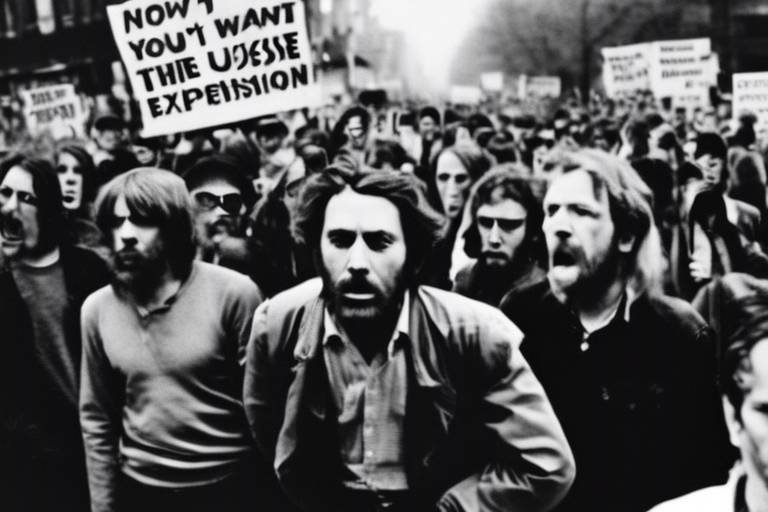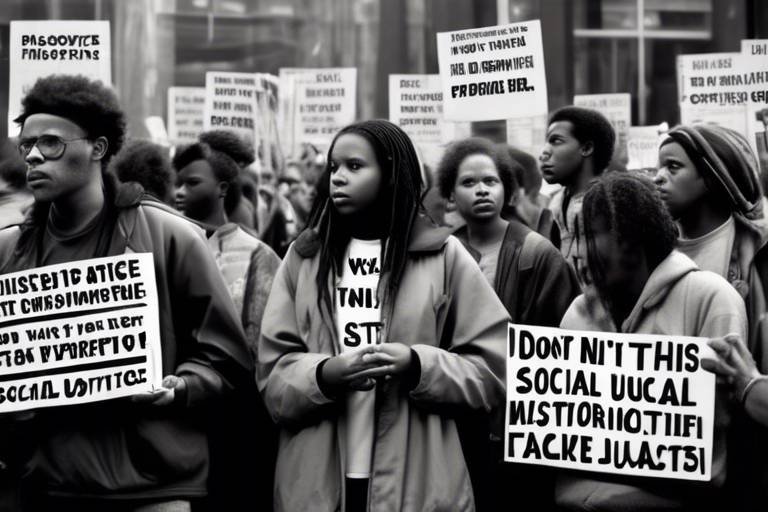The Philosophy and Politics of Universal Basic Income
Universal Basic Income (UBI) is more than just a financial concept; it's a radical idea that challenges the very fabric of our economic and social systems. Imagine a world where every individual receives a set amount of money regularly, regardless of their circumstances. Sounds like a dream, right? But what if this dream could actually become a reality? In this article, we will explore the foundational philosophies and political implications of UBI, examining its potential benefits, challenges, and the diverse perspectives surrounding its implementation in contemporary society. By the end, you might find yourself questioning not just the feasibility of UBI, but also its necessity in our ever-evolving world.
To truly grasp the significance of Universal Basic Income, we must first look back at its historical roots. The idea of providing a basic income to citizens isn't new; in fact, it can be traced back to early philosophical ideas and social welfare movements. Think of it as a seed that has been nurtured over centuries, sprouting into the discussions we have today. Early thinkers like Thomas Paine proposed a form of basic income in the 18th century, suggesting that every citizen should receive a financial dividend from the wealth generated by society. This notion laid the groundwork for modern discussions on economic security, as it highlights the belief that everyone deserves a fair share of the resources that society creates.
Various philosophical theories underpin the concept of UBI, intertwining notions of justice, equality, and human rights. At its core, UBI challenges us to rethink our understanding of what it means to live in a fair society. If we believe that every individual has the right to a dignified life, then shouldn't we ensure that everyone has access to the basic means of survival? This section delves into how these ideas support the argument for a guaranteed income for all, suggesting that UBI is not merely an economic policy but a moral imperative.
Let's dive into the utilitarian perspective, which advocates for actions that maximize overall happiness. Imagine a society where poverty is drastically reduced, and individuals have the freedom to pursue their passions without the constant worry of financial instability. Proponents argue that UBI could potentially increase societal well-being by providing a safety net that allows individuals to take risks, start businesses, or invest in their education. But how does this translate into real-world happiness?
Another compelling argument for UBI is its potential to enhance economic efficiency. Proponents suggest that by simplifying welfare systems and reducing bureaucracy, UBI could lead to a more streamlined approach to social support. Less red tape means quicker access to funds for those in need, ultimately benefiting both individuals and the economy as a whole. Imagine a world where resources are allocated more efficiently, leading to increased productivity and innovation. Sounds appealing, right?
However, while utilitarian arguments support UBI, critics raise valid concerns about its effectiveness in maximizing happiness. Some skeptics question whether providing a guaranteed income could create disincentives to work, potentially leading to a decline in productivity. They argue that if people receive money without having to earn it, what motivation do they have to contribute to society? This debate highlights the complexity of implementing UBI and the need to consider various perspectives before making a decision.
Now, let’s switch gears and look at the libertarian perspective. Libertarians advocate for minimal government intervention and champion individual freedom. So, how does UBI fit into this ideology? On one hand, UBI could be seen as a way to empower individuals by providing them with financial autonomy. On the other hand, it raises questions about personal responsibility and the role of the state in people's lives. Does providing a basic income undermine the work ethic that many libertarians value? This section examines how UBI aligns with or challenges libertarian ideals, sparking a debate that could reshape our understanding of freedom itself.
The political discourse surrounding UBI is anything but straightforward. It involves a complex interplay of various ideologies and parties, each bringing their unique perspectives to the table. Progressive politicians and movements often champion UBI as a means to address inequality and support marginalized communities. They highlight its potential to promote social justice and economic equity, arguing that it's a necessary step toward creating a fairer society. However, conservative viewpoints frequently express skepticism about UBI, focusing on concerns regarding fiscal responsibility and potential dependency. They worry about the implications for traditional work ethics and values, raising questions about the sustainability of such a system. The debate is rich and multifaceted, reflecting the diverse beliefs that shape our political landscape.
Many progressive politicians and movements see UBI as a powerful tool to combat inequality. By providing a basic income, they argue that we can uplift marginalized communities and create a more equitable society. This perspective emphasizes the importance of social justice, suggesting that UBI could help level the playing field for those who have been historically disadvantaged. But can a financial safety net truly lead to social change? This question remains at the heart of the UBI debate.
On the flip side, conservative critiques of UBI often center around concerns about fiscal responsibility and dependency. Critics argue that a universal income could foster a culture of reliance on government support, undermining the traditional work ethic that many value. They express apprehension about the long-term sustainability of such a system, questioning whether it could lead to increased taxes and a strain on public resources. As we navigate this complex political landscape, it's essential to consider these critiques and explore potential solutions that address both sides of the debate.
- What is Universal Basic Income? UBI is a financial program where all citizens receive a regular, unconditional sum of money from the government, regardless of their income or employment status.
- How would UBI be funded? Funding for UBI could come from various sources, including tax reforms, reductions in other welfare programs, or increased taxes on wealth and corporations.
- Could UBI reduce poverty? Proponents argue that UBI could significantly reduce poverty by providing a financial safety net for all individuals, allowing them to meet their basic needs.
- What are the potential drawbacks of UBI? Critics highlight concerns about fiscal sustainability, potential disincentives to work, and the impact on traditional values associated with employment.

The Historical Context of UBI
Understanding the origins of Universal Basic Income (UBI) is crucial for grasping its significance in today's socio-economic landscape. The concept isn't just a modern invention; it has roots that stretch back to early philosophical ideas and various social welfare movements. In fact, the seeds of UBI can be traced back to the Enlightenment period, when thinkers like Thomas Paine and John Stuart Mill began advocating for the rights of individuals to receive a basic level of financial support from the state. Paine, in his 1797 pamphlet "Agrarian Justice," proposed a system where every citizen would receive a sum of money at the age of 21, funded by a tax on landowners. This early vision was revolutionary, suggesting that economic security should be a fundamental right.
Fast forward to the 20th century, and we see a surge in interest surrounding UBI as industrialization and urbanization transformed economies. The Great Depression highlighted the need for social safety nets, leading to the establishment of welfare programs in many countries. However, the idea of a guaranteed income remained largely theoretical until the late 20th century, when technological advancements and globalization began to reshape labor markets. As jobs became increasingly precarious, the call for a system that could provide financial stability for all gained traction.
In the 1960s and 1970s, several pilot programs emerged, testing the viability of UBI-like systems. One notable example is the Mincome project in Canada, which provided a guaranteed annual income to residents of Dauphin, Manitoba. The results were promising, showing improvements in health and education outcomes among participants. Despite these positive findings, political will waned, and the project was ultimately discontinued. Nevertheless, these early experiments laid the groundwork for ongoing discussions about UBI as a viable solution to contemporary economic challenges.
Today, the conversation around UBI is more relevant than ever, especially in the context of rising inequality and the impact of automation on jobs. As we look back at the historical context of UBI, it's clear that the idea has evolved, shaped by changing societal needs and economic realities. The philosophical underpinnings of UBI continue to resonate, as advocates argue for a system that not only addresses poverty but also empowers individuals to pursue their passions and contribute to society in meaningful ways.
In summary, the historical journey of UBI reflects a continuous struggle for economic justice and human rights. By examining its past, we can better understand the diverse perspectives surrounding its implementation today and the potential it holds for shaping a more equitable future.

Philosophical Foundations of UBI
The concept of Universal Basic Income (UBI) is not merely a modern economic proposal; it is deeply rooted in various philosophical ideologies that seek to address the fundamental questions of justice, equality, and human rights. At its core, UBI challenges us to reconsider what it means to live a dignified life in a society that is increasingly defined by economic disparity. The philosophical foundations of UBI can be traced through several key theories that advocate for a more equitable distribution of resources, emphasizing the intrinsic value of each individual.
One of the most compelling arguments for UBI arises from the principle of justice. Philosophers like John Rawls have argued that a just society is one that ensures the least advantaged members have access to the resources necessary for a decent life. UBI embodies this principle by providing a financial safety net that allows individuals to meet their basic needs, thus promoting a more equitable society. Imagine a world where everyone, regardless of their circumstances, has the means to pursue their passions and contribute to society. This is the essence of justice that UBI seeks to achieve.
Moreover, the idea of equality plays a crucial role in the philosophical underpinnings of UBI. In a society where wealth is increasingly concentrated among the few, UBI serves as a counterbalance, ensuring that everyone receives a share of the economic pie. This is not just about financial support; it's about recognizing the inherent worth of every individual and affirming their right to live with dignity. By providing a basic income, we acknowledge that every person has equal value, and we take a significant step toward dismantling systemic inequalities.
Additionally, the notion of human rights is central to the UBI discourse. Advocates argue that access to a basic income is a fundamental human right, essential for survival and participation in society. This perspective aligns with international human rights frameworks, which assert that all individuals should have the right to an adequate standard of living. By framing UBI as a human right, proponents emphasize that it is not merely a welfare program but a moral imperative to ensure that everyone can lead a life free from poverty.
As we dive deeper into the philosophical foundations of UBI, we encounter various perspectives that enrich the debate. One such perspective is utilitarianism, which advocates for actions that maximize overall happiness. Supporters argue that UBI could significantly increase societal well-being by reducing poverty, enhancing individual freedom, and allowing people to pursue meaningful work rather than being trapped in low-wage jobs. The argument here is straightforward: when people have their basic needs met, they are more likely to contribute positively to society.
Utilitarianism, as a philosophical framework, suggests that the best actions are those that result in the greatest good for the greatest number. In the context of UBI, this perspective highlights several potential benefits:
- Poverty Reduction: By providing a guaranteed income, UBI could significantly reduce poverty levels, allowing individuals to afford basic necessities.
- Increased Freedom: With a stable income, individuals may feel empowered to pursue education, entrepreneurship, or creative endeavors, leading to a more dynamic economy.
- Enhanced Well-being: UBI could lead to improved mental health outcomes as financial stress diminishes, resulting in a happier society overall.
However, it is essential to consider critiques that arise from this utilitarian viewpoint. Critics argue that UBI might create disincentives to work, potentially leading to decreased productivity. They raise valid concerns about whether a guaranteed income could result in complacency among recipients, thereby undermining the very economic activity that UBI aims to stimulate. This debate is crucial, as it forces us to examine the balance between providing support and encouraging personal responsibility.
In conclusion, the philosophical foundations of UBI are rich and multifaceted, drawing from principles of justice, equality, and human rights. These ideas not only support the case for a universal income but also challenge us to rethink the societal structures that define our lives. As we navigate the complexities of modern economies, UBI stands as a beacon of hope, advocating for a future where everyone has the opportunity to thrive.
1. What is Universal Basic Income (UBI)?
UBI is a financial program that provides all citizens with a regular, unconditional sum of money, regardless of their circumstances, to ensure basic economic security.
2. How does UBI promote equality?
By providing everyone with a guaranteed income, UBI helps to level the economic playing field, reducing disparities and ensuring that all individuals can meet their basic needs.
3. What are the potential downsides of UBI?
Critics argue that UBI may create disincentives to work, lead to increased dependency on government support, and pose challenges to fiscal sustainability.

Utilitarian Perspectives
When we dive into the realm of Utilitarianism, we find a philosophy that is all about maximizing happiness and minimizing suffering. This perspective raises some fascinating questions about the potential of Universal Basic Income (UBI) to reshape our society. Imagine a world where everyone receives a guaranteed income—how would that change our daily lives? Proponents of UBI argue that it could significantly enhance societal well-being by tackling poverty head-on, providing individuals with the freedom to pursue their passions without the looming stress of financial instability.
Consider the impact of UBI on marginalized communities. With a basic income, individuals who have historically faced economic barriers could find themselves with the resources to invest in education, start businesses, or simply enjoy a better quality of life. It's like giving someone a sturdy lifeboat in a stormy sea; they can navigate through challenges with more confidence and resilience. The potential for reduced poverty rates is not just a statistic; it's a pathway to a more equitable society where everyone has the opportunity to thrive.
Furthermore, UBI could foster a culture of innovation. When people are less burdened by the fear of financial collapse, they are more likely to take risks, explore creative endeavors, and contribute to society in meaningful ways. Think of it as watering a garden—when you provide the right conditions, flowers bloom and flourish. In this way, UBI could act as a catalyst for economic growth, igniting a spark of creativity that benefits everyone.
However, it's essential to address the critiques that arise from the utilitarian perspective. Some skeptics argue that UBI might unintentionally create disincentives to work. They fear that if individuals receive a guaranteed income, they may opt for leisure over labor, potentially leading to a decline in productivity. This is a legitimate concern that merits consideration. After all, if people are less motivated to work, could we see a stagnation in economic progress? The challenge lies in striking a balance between providing security and encouraging personal responsibility.
Additionally, there are questions about the implementation of UBI: How would it be funded? Would it replace existing welfare programs or complement them? These are crucial considerations that policymakers must grapple with to ensure that the benefits of UBI are realized without creating new challenges. To illustrate this, let's take a look at a comparative table of potential funding sources for UBI:
| Funding Source | Description |
|---|---|
| Taxation on Wealth | Implementing higher taxes on the wealthiest individuals and corporations to redistribute wealth more equitably. |
| Carbon Tax | Introducing a tax on carbon emissions to discourage pollution while generating revenue for UBI. |
| Reduction of Subsidies | Reducing or eliminating certain government subsidies that may no longer be necessary, reallocating those funds to UBI. |
In conclusion, while the utilitarian perspective presents a compelling case for Universal Basic Income, it also invites a robust discussion about the implications of such a system. The potential for increased happiness and economic efficiency is tantalizing, but it's crucial to navigate the complexities with care. As we ponder these questions, we must remember that the ultimate goal is to create a society where everyone has the opportunity to thrive, not just survive.
- What is Universal Basic Income? UBI is a financial program where all citizens receive a regular, unconditional sum of money from the government, regardless of their circumstances.
- How could UBI reduce poverty? By providing a guaranteed income, UBI can help cover basic living expenses, reducing financial stress and allowing individuals to invest in their futures.
- What are the main criticisms of UBI? Critics often raise concerns about its funding, potential disincentives to work, and its impact on traditional welfare systems.

Economic Efficiency Arguments
The discourse surrounding Universal Basic Income (UBI) often highlights its potential to enhance economic efficiency, a concept that resonates deeply in today’s fast-paced world. Proponents argue that UBI can significantly streamline our welfare systems, reducing the layers of bureaucracy that currently burden both the government and the individuals it aims to assist. Imagine a world where every citizen receives a fixed income, eliminating the need for complex eligibility checks and means-testing that often lead to delays and confusion. This simplification could not only save administrative costs but also empower citizens to make choices that best suit their needs.
By providing a guaranteed income, UBI can foster a sense of financial security that encourages individuals to pursue entrepreneurial ventures, education, or even part-time work without the fear of losing their safety net. It’s akin to giving someone a safety harness while they climb the corporate ladder; they can take risks and explore opportunities without the constant worry of falling into poverty. Moreover, this newfound freedom can lead to a more dynamic and innovative economy as people are less tethered to jobs simply for survival.
Several studies have indicated that UBI can lead to increased consumer spending, which is a crucial driver of economic growth. When people have more disposable income, they tend to spend it on goods and services, stimulating local businesses and creating jobs. For instance, a recent pilot program in Finland showed that recipients of UBI reported higher levels of well-being and were more likely to invest in their education and skills, ultimately benefiting the economy at large.
Furthermore, UBI can reduce the stigma associated with welfare programs. Traditional welfare systems often carry a negative connotation, leading to feelings of shame among those who rely on them. UBI, on the other hand, is a universal approach that treats all citizens equally, fostering a sense of community and shared responsibility. This shift in perception can enhance social cohesion, leading to a more stable and productive society.
In summary, the economic efficiency arguments for UBI are compelling. They suggest that not only can it simplify welfare systems and reduce bureaucracy, but it can also stimulate economic growth, enhance individual freedom, and promote social equity. The potential benefits of UBI extend beyond mere financial support; they offer a vision of a society where everyone has the opportunity to thrive, contributing to a more vibrant and resilient economy.
- What is Universal Basic Income (UBI)?
UBI is a model of social security in which all citizens receive a regular, unconditional sum of money from the government, regardless of their circumstances.
- How does UBI impact the economy?
Proponents argue that UBI can stimulate economic growth by increasing consumer spending and reducing poverty levels, while also simplifying welfare systems.
- Are there any downsides to UBI?
Critics point to potential disincentives to work, concerns about fiscal sustainability, and the possibility of creating dependency on government support.
- How would UBI be funded?
Funding for UBI could come from various sources, including tax reforms, reductions in other welfare programs, or increased taxation on wealth and corporations.

Critiques from Utilitarianism
While the utilitarian perspective offers a compelling argument in favor of Universal Basic Income (UBI), it is not without its critiques. Detractors argue that UBI may not necessarily lead to the maximization of happiness for society as a whole. One significant concern is the potential for **disincentives to work**. If individuals receive a guaranteed income, some may choose to reduce their work hours or even opt out of the workforce entirely. This could lead to a decrease in overall productivity, which, in a utilitarian framework, would counteract the goal of maximizing societal happiness.
Moreover, critics suggest that UBI could create a **dependency culture**, where individuals rely solely on government support rather than seeking employment or pursuing personal development. This could undermine personal responsibility and initiative, which are often seen as essential components of a fulfilling life. Imagine a society where people feel less motivated to strive for their goals because they know their basic needs are met regardless of their efforts. Would that truly lead to greater happiness?
Another critique revolves around the **economic feasibility** of implementing UBI. Critics argue that funding a universal income for all citizens would require significant tax increases or reallocations of existing welfare budgets, potentially leading to public backlash and political instability. In essence, the question arises: can we truly afford to provide everyone with a basic income without jeopardizing other essential services?
Furthermore, the effectiveness of UBI in addressing poverty is debated. Some argue that while UBI may alleviate immediate financial stress, it does not tackle the underlying structural issues that cause poverty, such as **access to education** and **healthcare**. Without addressing these root causes, the benefits of UBI may be limited, ultimately failing to maximize happiness across the board. It raises a critical question: is a basic income sufficient to uplift individuals from poverty, or do we need a more comprehensive approach?
In summary, while utilitarianism provides a robust framework for understanding the potential benefits of UBI, it is essential to consider these critiques seriously. The balance between providing economic security and encouraging personal responsibility is delicate, and the implications of UBI on societal happiness demand thorough examination and thoughtful discourse.
- What is Universal Basic Income (UBI)? UBI is a model of social security in which all citizens receive a regular, unconditional sum of money from the government, regardless of their other income.
- How does UBI differ from traditional welfare programs? Unlike traditional welfare programs that often have strict eligibility requirements and conditions, UBI is universal and unconditional, aiming to simplify the welfare system.
- Can UBI reduce poverty? Proponents argue that UBI can provide a safety net for the poorest, potentially lifting many out of poverty. However, critics question its effectiveness in addressing the root causes of poverty.
- What are the economic implications of UBI? While UBI could stimulate consumer spending and economic growth, concerns about funding and potential disincentives to work pose significant challenges.
- Is UBI politically feasible? The political landscape surrounding UBI is complex, with support from progressive groups but skepticism from conservatives, making its implementation a contentious issue.

Libertarian Perspectives
When we dive into the world of Libertarianism, we encounter a fascinating blend of individualism and minimal government intervention. Libertarians champion the idea that personal freedom is paramount, and they often view Universal Basic Income (UBI) through a unique lens. At first glance, UBI might seem like a contradiction to their principles, as it involves government redistribution of wealth. However, many libertarians argue that it can actually enhance individual freedom by providing a safety net that allows people to pursue their passions without the constant fear of financial ruin.
One of the core tenets of libertarian philosophy is the belief in personal responsibility. Proponents of UBI within this framework argue that by ensuring a basic income for everyone, individuals would be empowered to take risks—whether that means starting a new business, pursuing education, or engaging in creative endeavors. Imagine a world where artists can focus on their craft without the pressure of making ends meet, or where entrepreneurs can innovate without the fear of failure. This perspective suggests that UBI can serve as a launchpad for personal growth and societal progress.
However, the libertarian perspective on UBI is not without its critiques. Many libertarians express concerns about the potential for dependency on government support. They argue that if individuals come to rely on a guaranteed income, it could diminish their motivation to work or contribute to society in other meaningful ways. This raises critical questions: Does UBI foster a sense of entitlement? Or does it encourage people to pursue their dreams without the shackles of financial insecurity?
Moreover, there is the issue of funding UBI. Libertarians are often wary of increased taxation, viewing it as a form of coercion. They argue that the government should not take money from individuals to redistribute it, even if the intention is to provide a safety net. This leads to a fundamental debate: is it ethical for the government to redistribute wealth, even if it aims to promote equality and support the less fortunate?
To summarize the libertarian viewpoint on UBI, we can consider the following key points:
- Empowerment through Security: UBI can provide individuals with the freedom to pursue their goals.
- Concerns about Dependency: Critics worry that UBI may reduce the incentive to work.
- Funding Dilemmas: The reliance on taxation raises ethical questions about government intervention.
Ultimately, the libertarian perspective on Universal Basic Income is a complex tapestry of ideals that invites ongoing discussion. While it offers intriguing possibilities for enhancing personal freedom, it also raises essential questions about responsibility, dependency, and the role of government in our lives. Navigating these waters requires careful consideration of both the potential benefits and the challenges that UBI presents within a libertarian framework.

Political Landscape and UBI
The conversation around Universal Basic Income (UBI) is as vibrant and multifaceted as a painter's palette. It’s not just a simple question of whether to implement UBI; it's a complex tapestry woven from various political ideologies and social values. As we dive into this political landscape, it's essential to understand how different factions perceive the concept of a guaranteed income for all. The debate is not merely academic; it has real-world implications for policies that can reshape our society.
On one hand, we have progressive politicians who see UBI as a beacon of hope, a tool that can significantly reduce inequality and provide a safety net for marginalized communities. For them, UBI is not just about financial support; it's about social justice. They argue that in an era where wealth is increasingly concentrated in the hands of a few, UBI could serve as a corrective measure, redistributing wealth and providing everyone with a basic standard of living. Imagine a world where individuals can pursue their passions without the constant fear of financial ruin; that’s the vision many progressives hold dear.
Conversely, conservative viewpoints often cast a skeptical eye toward UBI. Their concerns revolve around fiscal responsibility and the potential for creating dependency on government support. They argue that UBI could erode the traditional work ethic that has long been a cornerstone of American values. Critics fear that a guaranteed income might discourage individuals from seeking employment, leading to a decline in productivity. To some conservatives, UBI could be seen as a slippery slope towards a welfare state that undermines personal responsibility.
In the middle of these two camps are moderates who are cautiously optimistic. They recognize the potential benefits of UBI but also the challenges it presents. Many moderates advocate for pilot programs and studies to assess the impact of UBI before committing to a full-scale implementation. They believe in a balanced approach that takes into account both the economic implications and the social benefits. This cautious optimism reflects a broader trend in political discourse, where evidence-based policy-making is becoming increasingly important.
As we navigate through this political landscape, it’s crucial to consider the voices of those who will be affected by UBI. Public opinion plays a significant role in shaping policy. Recent surveys have shown that support for UBI varies widely across demographics and political affiliations. For instance, younger generations tend to be more favorable towards UBI, viewing it as a necessary adaptation to a rapidly changing job market influenced by automation and artificial intelligence.
To illustrate the varying perspectives on UBI, consider the following table that summarizes key arguments from different political ideologies:
| Political Ideology | Support for UBI | Key Arguments |
|---|---|---|
| Progressive | Strong Support | Reduces inequality, promotes social justice, empowers marginalized communities |
| Conservative | Skeptical | Concerns about dependency, fiscal responsibility, undermining work ethic |
| Moderate | Cautiously Optimistic | Support for pilot programs, evidence-based policy-making, balanced approach |
In conclusion, the political landscape surrounding UBI is a dynamic and evolving battleground. As debates continue and more data emerges from pilot programs, the conversation will likely shift. The key takeaway is that UBI is not just a policy proposal; it’s a reflection of our societal values and priorities. Are we ready to embrace a system that aims to provide economic security for all, or will we cling to traditional notions of work and responsibility? Only time will tell, but one thing is for sure: the discussion is far from over.
- What is Universal Basic Income (UBI)?
UBI is a model of social security in which all citizens receive a regular, unconditional sum of money from the government, regardless of other income. - How would UBI be funded?
Funding for UBI could come from various sources, including taxes on wealth, income, and consumption, as well as reallocating funds from existing welfare programs. - What are the potential benefits of UBI?
Potential benefits include reducing poverty, increasing financial security, promoting individual freedom, and simplifying the welfare system. - What are the criticisms of UBI?
Critics argue that UBI could discourage work, lead to dependency on government support, and strain public finances.

Progressive Support for UBI
In recent years, Universal Basic Income (UBI) has gained traction as a progressive solution to tackle the growing issues of inequality and economic insecurity. Advocates within progressive circles argue that UBI is not just a financial safety net; it's a transformative policy that can uplift marginalized communities and promote social justice. Imagine a society where every individual, regardless of their background, has the financial means to pursue their passions, education, or even start a business. This vision is at the heart of the UBI movement.
One of the most compelling arguments for UBI from a progressive standpoint is its potential to reduce poverty. By providing a guaranteed income, UBI can lift individuals and families above the poverty line, allowing them to meet their basic needs without the constant stress of financial insecurity. This is particularly crucial in a world where traditional jobs are increasingly unstable and the gig economy is on the rise. For many, the unpredictability of income can be overwhelming, leading to mental health issues and lower quality of life. UBI offers a way to alleviate this burden, granting people the freedom to make choices that enrich their lives.
Moreover, UBI is seen as a tool for promoting economic equity. It addresses systemic inequalities that have persisted for generations, particularly affecting women, people of color, and those from low-income backgrounds. By distributing wealth more evenly across society, UBI can help level the playing field, giving everyone a fair shot at success. Progressive supporters often point to studies that show how UBI can stimulate local economies. When people have money to spend, they contribute to their communities, supporting local businesses and creating jobs.
Another significant aspect of progressive support for UBI is its potential to challenge the traditional notions of work. In a rapidly changing economy, where automation and artificial intelligence are replacing many jobs, the concept of work is evolving. Progressive advocates argue that UBI can provide individuals with the freedom to pursue meaningful work—whether that means engaging in creative endeavors, volunteering, or caring for family members—without the constant pressure to earn a paycheck. This shift could lead to a more fulfilled and productive society, where people are motivated by passion rather than necessity.
However, the implementation of UBI is not without its challenges. Critics often raise concerns about funding such a program and the potential for it to create dependency. Yet, progressive supporters counter these arguments by suggesting various funding mechanisms, such as taxing the wealthiest individuals and corporations. By redistributing wealth, they argue, we can create a sustainable model for UBI that not only supports those in need but also fosters a healthier economy overall.
In conclusion, the progressive support for UBI is rooted in a desire for a more just and equitable society. By addressing poverty, promoting economic equity, and redefining the concept of work, UBI has the potential to create a brighter future for all. As discussions continue and more pilot programs are launched globally, the hope is that UBI will become a viable solution that empowers individuals and strengthens communities.
- What is Universal Basic Income (UBI)? UBI is a financial program that provides all citizens with a regular, unconditional sum of money, regardless of other income.
- How would UBI be funded? Various proposals suggest funding UBI through taxes on wealth, corporations, and reducing existing welfare programs.
- Could UBI lead to decreased motivation to work? While some argue this could happen, supporters believe it would allow individuals to pursue meaningful work without financial pressure.
- What are the potential benefits of UBI? Benefits include reducing poverty, promoting economic equity, and providing individuals with the freedom to choose how they spend their time.

Conservative Critiques of UBI
When it comes to Universal Basic Income (UBI), conservative critiques often arise from a deep-seated concern for fiscal responsibility and the potential for dependency on government support. Many conservatives argue that UBI, while seemingly beneficial on the surface, could lead to a significant increase in government expenditure, which may not be sustainable in the long run. They often question whether the funds necessary to support such a program could be sourced without imposing heavy tax burdens on the working population.
Furthermore, critics highlight the potential for UBI to create a culture of dependency. They argue that if individuals receive a guaranteed income without any conditions, it may discourage them from seeking employment or pursuing self-improvement opportunities. This concern is rooted in the belief that work is not just a means to earn a living, but also a vital contributor to personal dignity and societal contribution. The fear is that UBI could undermine the intrinsic motivation to work, leading to a decrease in productivity and economic growth.
Moreover, conservatives often express skepticism about the effectiveness of UBI in addressing the root causes of poverty. They argue that simply providing a financial cushion does not solve the underlying issues that lead to economic hardship, such as lack of education, job training, or access to quality employment opportunities. Instead of UBI, many conservatives advocate for targeted social programs that focus on empowering individuals through education and job training, believing that these measures would be more effective in promoting long-term economic stability.
Another point of contention is the impact of UBI on traditional work ethics and values. Many conservatives hold the view that work is a fundamental aspect of personal identity and societal structure. They fear that a guaranteed income could erode the work ethic that has historically been a cornerstone of American values. The concern is that if people can live comfortably without working, it could lead to a societal shift where the importance of hard work and personal responsibility is diminished.
In summary, while UBI may come with its fair share of appealing benefits, conservative critiques raise significant questions about its feasibility and implications. The dialogue surrounding UBI is complex, and these critiques emphasize the importance of considering the broader societal impacts of such a sweeping policy. Ultimately, the discussion invites us to explore not just the potential advantages of UBI, but also the potential pitfalls that could emerge from its implementation.
- What is Universal Basic Income (UBI)? UBI is a financial program that provides all citizens with a regular, unconditional sum of money, regardless of their circumstances.
- What are the main arguments in favor of UBI? Proponents argue that UBI can reduce poverty, simplify welfare systems, and enhance individual freedom.
- How do conservatives view UBI? Conservatives often critique UBI for concerns about fiscal responsibility, dependency, and its potential impact on work ethics.
- Are there any successful examples of UBI in practice? While there are pilot programs and experiments, no country has fully implemented UBI on a national scale yet.
- What alternatives do conservatives suggest instead of UBI? Many conservatives advocate for targeted social programs focused on education and job training to address poverty more effectively.
Frequently Asked Questions
- What is Universal Basic Income (UBI)?
Universal Basic Income (UBI) is a financial policy that proposes providing all citizens with a regular, unconditional sum of money, regardless of their circumstances. This concept aims to ensure a basic level of economic security for everyone, allowing individuals to meet their essential needs without the stress of financial instability.
- What are the philosophical foundations of UBI?
The philosophical underpinnings of UBI are rooted in ideas of justice, equality, and human rights. Supporters argue that every individual has a right to a basic income, which can promote fairness and social equity. Various philosophical theories, such as utilitarianism and libertarianism, contribute to the discourse surrounding UBI, each presenting unique perspectives on its implications for society.
- How could UBI impact poverty levels?
Proponents of UBI argue that it could significantly reduce poverty by providing a safety net for those in need. With a guaranteed income, individuals would have the financial stability to cover basic living expenses, which could lead to improved health, education, and overall quality of life. This safety net may empower people to pursue better job opportunities or invest in their skills without the constant pressure of financial insecurity.
- What are the potential economic benefits of UBI?
One of the key arguments for UBI is its potential to enhance economic efficiency. By simplifying welfare systems and reducing bureaucratic overhead, UBI could lead to a more streamlined approach to social support. Additionally, it may stimulate local economies as individuals spend their guaranteed income on goods and services, thereby driving demand and creating jobs.
- What are the critiques of UBI from a utilitarian perspective?
While utilitarianism supports UBI for its potential to increase overall happiness, critics raise concerns about its effectiveness. They argue that providing a guaranteed income might disincentivize work, leading to decreased productivity. This debate centers on whether the benefits of reduced poverty and increased freedom outweigh the potential drawbacks of a less motivated workforce.
- How do libertarians view UBI?
Libertarians generally advocate for minimal government intervention and emphasize personal responsibility. The perspective on UBI within this ideology is mixed; some see it as a means to reduce the size of government by replacing complex welfare programs, while others worry it could lead to increased state control over individual lives, challenging the core principles of freedom and self-reliance.
- What political ideologies support UBI?
Progressive movements and politicians are among the strongest supporters of UBI, viewing it as a tool to combat inequality and support marginalized communities. They argue that UBI can promote social justice and economic equity, helping to level the playing field for those who have been historically disadvantaged.
- What are the conservative critiques of UBI?
Conservative viewpoints often express skepticism about UBI, focusing on concerns about fiscal responsibility and the potential for dependency on government support. Critics argue that UBI could undermine traditional work ethics and values, creating a culture of reliance rather than self-sufficiency. They worry about the long-term sustainability of such a program and its impact on the economy.



















